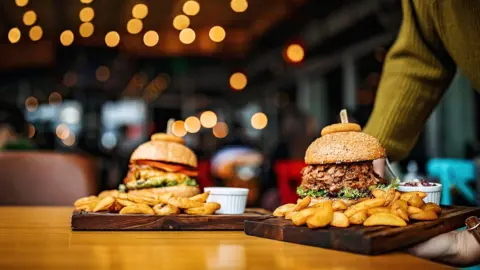Calorie labels have little impact on eating habits – study
 getty images
getty imagesPutting calories on food labels and menus is “not a silver bullet”, say researchers who have analyzed the best evidence to date on how effective the policy could be.
Review of 25 studies A small reduction in the number of calories people chose to eat was found on calorie labeling in several countries – the equivalent of two almonds – but even this modest effect could help prevent adults from gaining weight as they age.
New rules on calorie labeling come into force in England in 2022 as part of a government plan to encourage people to make healthier choices.
The government said it would continue to evaluate the impact of out-of-home calorie labeling, including the impact on people with eating disorders.
Restaurants, cafes and take-aways with more than 250 employees will now have to show how many calories are in the food on their menu.
For Imara, a 27-year-old HR assistant from Birmingham, this change has been a positive part of her weight loss journey.
“This means I’m able to stay on track, stay within my calorie deficit, and enjoy a good meal out with friends, or with my husband, and still have a good time and feel free to get off track.” No worries.
“Sometimes I’ll just eat food and not think about the calories,” she says.
“But if it’s a day or a week where I want to stay on track I’ll look at the calories and see if it’s something that will fit into my goals.”

The research looked at the impact of calorie labels in supermarkets, restaurants and other food stores in countries including the United States, Britain, Canada and France.
In a 600-calorie meal, people were found to lose an average of 11 calories (or 1.8%) in the food they selected and purchased.
Senior author Dr Gareth Hollands, of University College London, said there was “a small but potentially meaningful effect on people’s food choices” but “we should not expect miracles”.
He said calorie labeling “could have a useful role” – along with other measures such as taxes, marketing restrictions and reforms on food and beverages – allowing manufacturers to adjust recipes to make food products healthier.
Dr Natasha Clark of Bath Spa University, who started the project at the University of Cambridge, says the evidence is “strong”.
And as calorie labeling becomes more widespread, its impact could have a “meaningful contribution” to public health.
‘Poisonous way of looking at food’
 Millie Goldsmith
Millie GoldsmithHowever, charities say the policy could make people with eating disorders more anxious about food, leading to a relapse.
Millie Goldsmith, a 27-year-old lifestyle influencer from London, struggled with anorexia nervosa and body dysmorphia from the ages of 13 to 18.
She says counting calories is what fueled her eating disorder.
“I really feel like it’s just reinforcing those eating habits and making it a very toxic way of looking at food.”
Although Millie is recovering, she describes a constant battle between her “eating-disordered brain” and her “logical brain” to avoid paying attention to the calories in her meals.
The review acknowledged a “paucity of data” on potential harms, including mental health effects, and the authors recommended future research to assess this.
To encourage healthy eating, the government has already announced plans to ban calorie labeling in England, as well as junk food advertisements on TV and online.
It’s part of a wider plan to tackle high rates obesity,
A Department of Health and Social Care spokesperson said: “We have also given local authorities stronger powers to block applications for unhealthy takeaways near schools, to stop fast-food giants targeting pupils. “
The Scottish Government is consulting on whether restaurants and cafes should display calorie levels.



